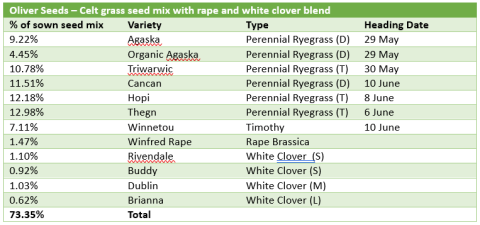Cilywinllan Project update - September 2023
Three 2.2 - 2.7 hectare fields, once managed as one field which received the same treatment, have been split into 6 plots for the project. The following field operations were undertaken:
- 30th August 2023 - Plot 1 ploughed and worked
- 30th August 2023 - Destroyed current pastures in subplots 2a and 3a using Glyphosate at recommended rate. Destroyed current pastures in subplots 2b and 3b using Glyphosate at a reduced rate and recommended rates of Fulvic acid and Citric acid. Also applied Calciprill at a rate of 200 kg/ac (494.21 kg/ha) and 100 kg/ac (247.11 kg/ha) of 05:24:24 for establishment for all plots.
- 9th September 2023 - Seed direct drilled at recommended seed rate for plots 2 and 3 using Vredo drill. Seed broadcasted at recommended seed rate for plot 1. All plots rolled to consolidate to ensure good soil to seed contact.
The following seed mixture was seeded on all plots -
- Grass mix with rape and white clover blend
- Mixed herbs, including Plantain, Chicory and Sheep’s burnett
- Mixed legumes, including Alsike Clover, Red Clover blend, Birdsfoot trefoil and Altaswede Red Clover
Rates and varieties can be seen in in Figure 1, 2 and 3
Figure 1. Grass mix with rape and white clover blend
Figure 2. Mixed herbs seed mix
Figure 3. Mixed legumes seed mix
ll three blends were mixed together well at the recommended rates prior to sowing.
While 3 subplots were sown with untreated seeds, the other 3 subplots (details are below) were sown with seeds mixed with a mycorrhizal fungi and rhizobacteria inoculant. The product used in this trial is a grit like product which is mixed in with the seed at drilling. The product contains arbuscular mycorrhizal fungi and plant growth promoting rhizobacteria (PGPR). This product aims to increase N and P availability and also enhances drought tolerance. In limited trials this has shown a yield increase of up to 25% in grass leys.
The trial was set up as follows;
|
|
|
|
|
Seed rate
|
|
|
Next steps:
All plots will be lightly grazed late autumn 2023 and early spring 2024. Field observations and data collection will take place over the summer months and into autumn 2024.



